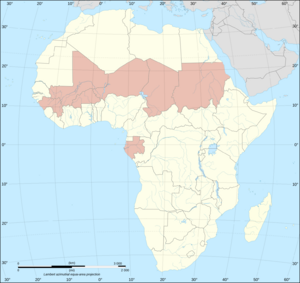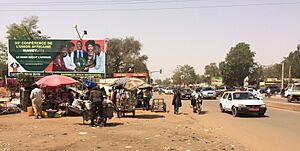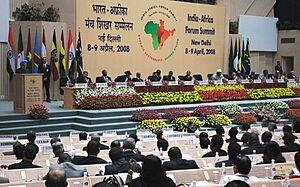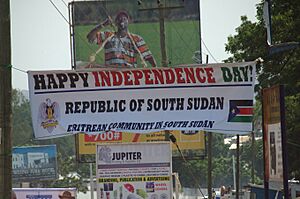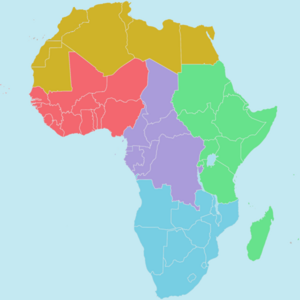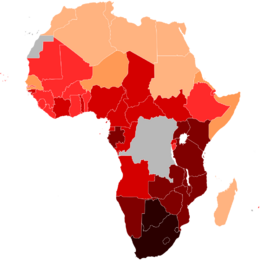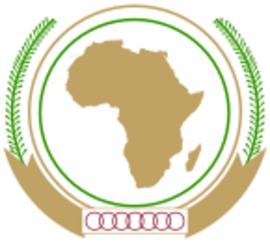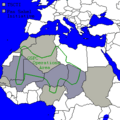African Union facts for kids
Quick facts for kids
African Union
|
|||||||||||||
|---|---|---|---|---|---|---|---|---|---|---|---|---|---|
|
Flag
|
|||||||||||||
|
Motto: "A United and Strong Africa"
|
|||||||||||||
|
Anthem: "Let Us All Unite and Celebrate Together"
|
|||||||||||||
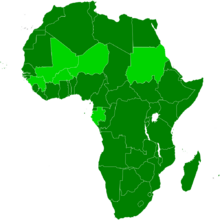
Member states
Suspended states |
|||||||||||||
| Political centres | |||||||||||||
| Largest urban agglomerations | |||||||||||||
| Official languages |
|
||||||||||||
| Demonym(s) | African | ||||||||||||
| Type | Continental union | ||||||||||||
| Membership |
55 member states
9 observer states
|
||||||||||||
| Leaders | |||||||||||||
|
• Chairperson
|
João Lourenço | ||||||||||||
|
• Commission Chairperson
|
Mahamoud Ali Youssouf | ||||||||||||
|
• Parliamentary President
|
Fortune Z. Charumbira | ||||||||||||
| Legislature | Pan-African Parliament | ||||||||||||
| Establishment | |||||||||||||
|
• OAU Charter
|
25 May 1963 | ||||||||||||
|
• Abuja Treaty
|
3 June 1991 | ||||||||||||
|
• Sirte Declaration
|
9 September 1999 | ||||||||||||
|
• African Union founded
|
July 9, 2002 | ||||||||||||
| 9 July 2011 | |||||||||||||
|
• Admission of Morocco
|
31 January 2017 | ||||||||||||
|
• African Continental Free Trade Area (AfCFTA)
|
1 January 2021 | ||||||||||||
| Area | |||||||||||||
|
• Total
|
29,922,059 km2 (11,552,972 sq mi) | ||||||||||||
| Population | |||||||||||||
|
• 2023 estimate
|
|||||||||||||
| GDP (PPP) | 2025 estimate | ||||||||||||
|
• Total
|
|||||||||||||
|
• Per capita
|
|||||||||||||
| GDP (nominal) | 2025 estimate | ||||||||||||
|
• Total
|
|||||||||||||
|
• Per capita
|
|||||||||||||
| HDI (2020) | 0.577 medium |
||||||||||||
| Internet TLD | .africa | ||||||||||||
|
|||||||||||||
The African Union (AU) is a group of 55 countries located on the continent of Africa. It works like a team for all African nations. The AU was officially started on July 9, 2002, in Durban, South Africa. It took over from an older group called the Organisation of African Unity (OAU), which was formed in 1963.
The main office for the AU, called the African Union Commission, is in Addis Ababa, Ethiopia. The largest city in the AU is Lagos, Nigeria. The AU covers a huge area of about 30 million square kilometers (11.6 million square miles). This includes famous places like the Sahara Desert and the Nile River. More than 1.3 billion people live in the countries that are part of the AU.
The main languages used by the AU are Arabic, English, French, Portuguese, Spanish, and Swahili. The AU has important groups like the Peace and Security Council and the Pan-African Parliament. In 2023, the African Union became a member of the G20 (Group of 20) at a meeting in New Delhi, India.
Contents
- What the African Union Does
- How the African Union Started
- How the African Union Works
- African Geography
- African Economy
- African People
- African Culture
- Images for kids
- See also
What the African Union Does
The African Union has several important goals:
- To bring African countries and people closer together.
- To protect the independence and land of its member countries.
- To help the continent grow politically and economically.
- To speak up for Africa's interests on the world stage.
- To work with other countries, following the rules of the Charter of the United Nations and the Universal Declaration of Human Rights.
- To promote peace, safety, and stability across Africa.
- To encourage fair elections, good leadership, and people's involvement in government.
- To protect human rights, following the African Charter on Human and Peoples' Rights.
- To help Africa play a bigger role in the global economy and international talks.
- To support sustainable development and connect African economies.
- To work together in all areas to improve the lives of African people.
- To coordinate policies among existing and future regional economic groups.
- To help Africa develop by supporting research, especially in science and technology.
- To work with international partners to stop preventable diseases and improve health in Africa.
The AU has different parts that make decisions and manage its work. The most important decisions are made by the Assembly of the African Union. This group includes all the leaders of the AU member countries. The AU also has a group called the Pan-African Parliament, which has 265 members chosen by the national parliaments of AU countries.
Other important groups in the AU include:
- The Executive Council: This group is made up of foreign ministers and helps prepare decisions for the Assembly.
- The Permanent Representatives Committee: This group consists of ambassadors from AU member states in Addis Ababa.
- The Economic, Social, and Cultural Council (ECOSOCC): This is a group that advises the AU and includes people from different parts of society.
The African Union Commission is like the main office that manages the AU's activities. Its chairperson is Mahamoud Ali Youssouf.
Some AU groups are located in different countries:
- The African Commission on Human and Peoples' Rights is in Banjul, the Gambia.
- The Pan-African Parliament is in Midrand, South Africa.
The AU has also sent soldiers to help keep peace in places like Burundi and Somalia. They also helped in Sudan during the Darfur Conflict before the United Nations took over.
The AU has created important rules and agreements for the continent. These include the African Union Convention on Preventing and Combating Corruption (2003) and the African Charter on Democracy, Elections and Governance (2007).
How the African Union Started
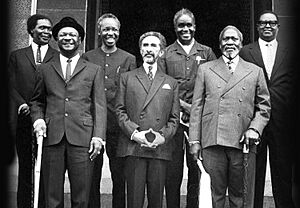
The idea for the African Union began with the First Congress of Independent African States in Accra, Ghana, in 1958. This meeting aimed to celebrate Africa's freedom from colonial rule. Later, the Organisation of African Unity (OAU) was formed on May 25, 1963. Some people felt the OAU didn't do enough to protect citizens from their own leaders.
The idea of creating the AU was brought up again in the mid-1990s. Leaders of the OAU signed the Sirte Declaration in Libya on September 9, 1999, calling for the African Union to be created. This led to more meetings where the rules for the AU were agreed upon.
The African Union officially started in Durban on July 9, 2002. Its first leader was Thabo Mbeki, who was the head of South Africa at the time.
Since 2010, the African Union has been working towards creating a joint African Space Agency. In 2015, Barack Obama was the first United States president to speak at the African Union in Addis Ababa. He encouraged more trade and investment in Africa and praised progress in education and the economy.
How the African Union Works
The African Union has several official groups that help it run:
- Pan-African Parliament (PAP): This group aims to be the main law-making body of the AU. It has 265 members chosen by the parliaments of AU countries. Its goal is to let people and groups have a say in how the AU is governed.
- Assembly of the African Union: This is the highest decision-making body, made up of the leaders of AU countries. It meets once a year and makes decisions by agreement or by a two-thirds vote.
- African Union Commission: This is the main office of the AU, with ten commissioners and staff. It is in Addis Ababa, Ethiopia. It manages and coordinates the AU's activities and meetings.
- Court of Justice of the African Union: This court was created to settle disagreements about AU agreements. It is planned to combine with the African Court on Human and Peoples' Rights to form a single court for justice and human rights.
- Executive Council: This group is made up of ministers from member countries. They make decisions on things like trade, social security, and communication.
- Permanent Representatives' Committee: This committee prepares work for the Executive Council.
- Peace and Security Council (PSC): This group was set up in 2004 to help prevent and manage conflicts in Africa. It can approve peacekeeping missions and take action in crisis situations. It has fifteen members chosen by the Assembly.
- Economic, Social and Cultural Council: This is an advisory group with experts and community representatives.
The AU also plans to have its own financial institutions, including an African Central Bank, an African Investment Bank, and an African Monetary Fund. Eventually, the AU hopes to have a single currency for Africa.
The Africa Centres for Disease Control and Prevention (Africa CDC) was founded in 2016 to help with health issues. The African Commission on Human and Peoples' Rights works to protect human rights. The African Space Agency was officially formed in 2023 and is based in Cairo.
Member Countries
All countries in Africa and on African islands that are members of the United Nations are part of the AU. This also includes the Sahrawi Arab Democratic Republic (SADR). Morocco rejoined the AU in 2017 after leaving in 1984 because of the SADR's membership.
Sometimes, a country's membership in the AU can be suspended if there are problems with its government, like a military takeover. For example, Mali, Guinea, Sudan, Burkina Faso, Niger, and Gabon have had their memberships suspended at different times due to military coups.
Members
 Algeria
Algeria Angola
Angola Benin
Benin Botswana
Botswana Burkina Faso (suspended)
Burkina Faso (suspended) Burundi
Burundi Cameroon
Cameroon Cape Verde
Cape Verde Central African Republic
Central African Republic Chad
Chad Comoros
Comoros Democratic Republic of the Congo
Democratic Republic of the Congo Republic of the Congo
Republic of the Congo Djibouti
Djibouti Egypt
Egypt Equatorial Guinea
Equatorial Guinea Eritrea
Eritrea Swaziland
Swaziland Ethiopia
Ethiopia Gabon
Gabon Gambia
Gambia Ghana
Ghana Guinea (suspended)
Guinea (suspended) Guinea-Bissau
Guinea-Bissau Côte d'Ivoire
Côte d'Ivoire Kenya
Kenya Lesotho
Lesotho Liberia
Liberia Libya
Libya Madagascar
Madagascar Malawi
Malawi Mali (suspended)
Mali (suspended) Mauritania
Mauritania Mauritius
Mauritius Morocco
Morocco Mozambique
Mozambique Namibia
Namibia Niger (suspended)
Niger (suspended) Nigeria
Nigeria Rwanda
Rwanda Sahrawi Arab Democratic Republic
Sahrawi Arab Democratic Republic São Tomé and Príncipe
São Tomé and Príncipe Senegal
Senegal Seychelles
Seychelles Sierra Leone
Sierra Leone Somalia
Somalia South Africa
South Africa South Sudan
South Sudan Sudan (suspended)
Sudan (suspended) Tanzania
Tanzania Togo
Togo Tunisia
Tunisia Uganda
Uganda Zambia
Zambia Zimbabwe
Zimbabwe
Observers
 Haiti
Haiti Israel (suspended as of February 2023)
Israel (suspended as of February 2023) Kazakhstan
Kazakhstan Latvia
Latvia Mexico
Mexico Palestine
Palestine Serbia
Serbia Turkey
Turkey Ukraine
Ukraine United Arab Emirates
United Arab Emirates
Leadership and Governance
A big discussion in the AU is about creating a "Union Government" to move towards a United States of Africa. Some countries want a strong central government with an AU army, while others prefer to strengthen the current AU groups.
The AU has also focused on connecting different regions of Africa. There are eight main Regional Economic Communities (RECs) recognized by the AU. These groups help with integration at a regional level.
The chairperson of the African Union changes each year, rotating among different regions. The current chairperson is Mohamed Ould Ghazouani, President of Mauritania, whose term began on February 17, 2024.
List of Chairpersons
| Name | Beginning of term | End of term | Country |
|---|---|---|---|
| Thabo Mbeki | 9 July 2002 | 10 July 2003 | |
| Joaquim Chissano | 10 July 2003 | 6 July 2004 | |
| Olusegun Obasanjo | 6 July 2004 | 24 January 2006 | |
| Denis Sassou-Nguesso | 24 January 2006 | 24 January 2007 | |
| John Kufuor | 30 January 2007 | 31 January 2008 | |
| Jakaya Kikwete | 31 January 2008 | 2 February 2009 | |
| Muammar al-Gaddafi | 2 February 2009 | 31 January 2010 | |
| Bingu wa Mutharika | 31 January 2010 | 31 January 2011 | |
| Teodoro Obiang Nguema Mbasogo | 31 January 2011 | 29 January 2012 | |
| Yayi Boni | 29 January 2012 | 27 January 2013 | |
| Hailemariam Desalegn | 27 January 2013 | 30 January 2014 | |
| Mohamed Ould Abdel Aziz | 30 January 2014 | 30 January 2015 | |
| Robert Mugabe | 30 January 2015 | 30 January 2016 | |
| Idriss Déby | 30 January 2016 | 30 January 2017 | |
| Alpha Condé | 30 January 2017 | 28 January 2018 | |
| Paul Kagame | 28 January 2018 | 10 February 2019 | |
| Abdel Fattah el-Sisi | 10 February 2019 | 10 February 2020 | |
| Cyril Ramaphosa | 10 February 2020 | 10 February 2021 | |
| Félix Tshisekedi | 10 February 2021 | 5 February 2022 | |
| Macky Sall | 5 February 2022 | 18 February 2023 | |
| Azali Assoumani | 18 February 2023 | 17 February 2024 | |
| Mohamed Ould Ghazouani | 17 February 2024 | Incumbent |
AU Headquarters
The main office of the African Union is in Addis Ababa, Ethiopia. A new headquarters building, the African Union Conference Center and Office Complex (AUCC), was opened in 2012. China built this complex as a gift. The main tower is 99.9 meters tall, representing September 9, 1999, the date the OAU decided to become the African Union.
Espionage Allegations
In 2018, a French newspaper claimed that the Chinese government had put listening devices in the AU headquarters building. The Chinese government and AU officials denied these claims, calling them "groundless." However, the African Union did replace its Chinese-supplied computer servers and started encrypting its communications after these reports.
AU Meetings (Summits)
The African Union holds regular meetings called summits. These are important gatherings where leaders discuss key issues facing the continent.
| Session | Host country | Host city | Date | Theme | Notes |
|---|---|---|---|---|---|
| 37th | Addis Ababa | 17–18 February 2024 | "Educate and Skill Africa for the 21st Century" | ||
| 36th | Addis Ababa | 18–19 February 2023 | |||
| 35th | Addis Ababa | 5–6 February 2022 | |||
| 34th | Addis Ababa | 6–7 February 2021 | |||
| 33rd | Addis Ababa | 9–10 February 2020 | "Silencing the guns: creating conducive conditions for Africa's development" | Agreement for African Continental Free Trade Agreement to become operational in July 2020. Agreements to reduce gender gap and inequality and to "silence guns" on the continent. | |
| 12th Extraordinary Summit on AfCFTA | Niamey | 4–8 July 2019 | "Refugees, Returnees and Internally Displaced Persons: Towards Durable Solutions to Forced Displacement in Africa" | Launch of the African Continental Free Trade Agreement | |
| 32nd | Addis Ababa | 10–11 February 2019 | "Refugees, Returnees and Internally Displaced Persons: Towards Durable Solutions to Forced Displacement in Africa" | ||
| 11th Extraordinary Summit on AfCFTA | Addis Ababa | 5–18 November 2018 | Agreement reached on reorganisation AU Commission | ||
| 31st | Nouakchott | 25 June – 2 July 2018 | "Winning the Fight Against Corruption: A Sustainable Path to Africa's Transformation" | ||
| 10th Extraordinary Summit on AfCFTA | Kigali | 17–21 March 2018 | "Creating One African Market" | Agreement reached on the AfCFTA | |
| 30th | Addis Ababa | 22–29 January 2018 | "Winning the Fight Against Corruption: A Sustainable Path to Africa's Transformation" | ||
| 29th | Addis Ababa | 27 June – 4 July 2017 | "Harnessing the Demographic Dividend Through Investments in Youth" | ||
| 28th | Addis Ababa | 22–31 January 2017 | "Harnessing the Demographic Dividend Through Investments in Youth" | Morocco rejoins the AU after 33 years | |
| 27th | Kigali | 10–18 July 2016 | "African Year of Human Rights with Particular Focus on the Rights of Women" | Launch of African Union Passport | |
| 26th | Addis Ababa | 21–31 January 2016 | "African Year of Human Rights with Particular Focus on the Rights of Women" | ||
| Third India-Africa Forum Summit | New Delhi | 26–29 October 2015 | "Reinvigorated Partnership—Shared Vision" | ||
| 25th | Johannesburg | 7–15 June 2015 | "Year of Women Empowerment and Development Towards Africa's Agenda 2063" | Featured Angelina Jolie | |
| 24th | Addis Ababa | 23–31 January 2015 | "Year of Women Empowerment and Development Towards Africa's Agenda 2063" | ||
| 2nd Africa–Turkey Summit | Malabo | 19–21 November 2014 | "A New Model of Partnership to Enhance a Sustainable Development and Integration of Africa" | ||
| 23rd | Malabo | 20–27 June 2014 | "Year of Agriculture and food security" | ||
| 22nd | Addis Ababa | 21–31 January 2014 | "Year Agriculture and food security, Marking 10th Anniversary of the Adoption of the Comprehensive Africa Agriculture Development Programme (CAADP)" | ||
| Extraordinary Summit on the ICC | Addis Ababa | 11–12 October 2013 | "Africa's Relationship with the ICC" | This was in regards to the ICC's non-adherence to AU calls to drop certain charges against sitting leaders and claims that it was disproportionally targeting Africans. | |
| 21st | Addis Ababa | 19–27 May 2013 | "Panafricanism and African Renaissance" | 50th Anniversary of the Establishment of the Organisation of African Unity | |
| 20th | Addis Ababa | 27–28 January 2013 | "Panafricanism and African Renaissance" | ||
| Diaspora Summit | Sandton | 23–25 May 2012 | "Towards the Realisation of a United and Integrated Africa and Its Diaspora" | ||
| 19th | Addis Ababa | 9–16 July 2012 | "Boosting Intra-African Trade" | ||
| 18th | Addis Ababa | 23–30 January 2012 | "Boosting Intra-African Trade" | ||
| 17th | Malabo | 23 June – 1 July 2011 | "Youth Empowerment for Sustainable Development" | ||
| 2nd Africa–India Summit | Addis Ababa | 20–25 May 2011 | "Enhancing partnership: shared vision" | ||
| 16th | Addis Ababa | 24–31 January 2011 | "Towards Greater Unity and Integration through Shared Values" | ||
| 15th | Kampala | 19–27 July 2010 | "Maternal, Infant, and Child Health and Development in Africa" | ||
| 14th | Addis Ababa | 25 January – 2 February 2010 | "Information and Communication Technologies (ICT) in Africa: Challenges and Prospects for Development" | ||
| 13th | Sirte | 24 June – 3 July 2009 | "Investing in Agriculture for Economic Growth and Food Security" | ||
| 12th | Addis Ababa | 26 January – 3 February 2009 | "Infrastructure Development in Africa" | ||
| 11th | Sharm el-Sheikh | 24 June – 1 July 2008 | "Meeting the Millennium Development Goals on Water and Sanitation" | ||
| 10th | Addis Ababa | 25 January – 2 February 2008 | "Industrial Development of Africa" | ||
| 9th | Accra | 25 June – 6 July 2007 | "Grand Debate on the Union Government" | ||
| 8th | Addis Ababa | 22–30 January 2007 | 1. "Science, Technology and Scientific Research for Development" 2. "Climate Change in Africa" |
||
| 7th | Banjul | 25 June – 2 July 2006 | "Rationalisation of Recs and Regional Integration" | ||
| 6th | Khartoum | 16–24 January 2006 | "Education and Culture" | ||
| 5th | Sirte | 28–29 June 2005 | |||
| Extraordinary summit on UN Reform | Addis Ababa | 4 August 2005 | |||
| 4th | Abuja | 24–31 January 2005 | |||
| 3rd | Addis Ababa | 6–8 July 2004 | |||
| 2nd | Maputo | 2–12 July 2003 | |||
| 1st | Durban | 28 June 2002 – 10 July 2002 | "Peace, Development and Prosperity: The African Century" | Notable events include the launch of the African Union. |
Global Partnerships
The African Union works with many other international groups and countries. It represents Africa's interests in global discussions.
Africa and the Caribbean
Many Caribbean nations want to build stronger ties with Africa. The AU sees the Caribbean as a possible "Sixth Region" of the group. Some Caribbean countries have joined African financial groups, like the African Export–Import Bank.
Africa and China
People's Republic of China (PRC) is a major economic partner for Africa. The Forum on China–Africa Cooperation helps coordinate their relationship.
Africa and Europe
The European Union sees its relationship with Africa as very important. They work together on things like green energy, digital technology, jobs, peace, and security. They also partner on managing natural resources and dealing with climate change.
Africa and India
The India–Africa Forum Summit (IAFS) is the main platform for relations between Africa and India. These summits happen every three years. In 2023, the African Union became a member of the G20 under India's leadership.
Africa and Palestine
The African Union often invites the President of the State of Palestine to speak at its annual summit. The AU has called for an end to fighting and supports the idea of an independent Palestinian state.
Africa and Russia
Russia has hosted summits with African leaders to strengthen their relationship. The second Russia-Africa Summit took place in July 2023.
Africa and South Korea
The first South Korea–Africa Summit was held in Seoul in June 2024.
Africa and Turkey
Turkey and Africa have grown closer since 2008. Turkey has many embassies and commercial offices in African countries.
Africa and the United States
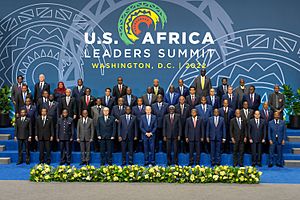
The African Union works with the United States on various issues. In 2017, when the US issued a travel ban affecting some African countries, African leaders expressed their concerns.
Military and Peacekeeping Efforts
The African Union has the power to step in militarily in member countries in serious situations, like war crimes or genocide. The Peace and Security Council is the main group that handles these decisions.
Peacekeeping Missions
The AU has sent peacekeeping forces to different countries to help maintain stability.
- Togo: In 2005, when the president of Togo died and his son took over, the AU called it a military takeover. The AU's protest helped lead to elections.
- Mauritania: The AU suspended Mauritania's membership twice after military takeovers in 2005 and 2008. Membership was restored when the country returned to democratic rule.
- Mali: After a military takeover in 2012 and fighting with extremist groups, the AU helped form a temporary government and supported elections. AU forces have also worked to fight against rebel groups in Mali.
- Somalia: Since 2007, the AU has had a peacekeeping mission in Somalia (AMISOM) to help the government and provide aid. They have fought against the extremist group al-Shabaab and helped take back important cities.
- Anjouan, Comoros: In 2008, the AU and Comoros forces successfully intervened in Anjouan to remove a self-declared president whose election was illegal.
The AU is also working to create an African Standby Force (ASF). This force would be ready to deploy quickly in emergencies, especially in cases of human rights violations.
Darfur, Sudan
The AU sent 7,000 peacekeepers to Darfur, Sudan, to help with the conflict there. These forces faced challenges due to lack of funds and resources. The mission later merged with a United Nations mission.
Chagos Islands Dispute
The AU has urged the United Kingdom to follow a UN resolution to return the Chagos Archipelago to Mauritius. The UK and Mauritius disagree about who owns these islands.
Current Challenges
The AU faces many challenges, including health issues like fighting malaria and AIDS/HIV; political issues like dealing with conflicts; economic issues like improving living standards; and environmental issues like famines and desertification.
Corruption
There have been concerns about corruption within the African Union. Some staff members have raised issues about how the organization is managed.
Libyan Crisis
In 2011, when conflict started in Libya, the AU was criticized for not acting quickly. The AU tried to help find a peaceful solution, but a military intervention led by NATO made it difficult. The AU later recognized the new government in Libya and continues to work towards peace in the country.
African Geography
The countries of the African Union cover almost all of the African continent. This includes diverse landscapes like the world's largest hot desert, the Sahara, vast jungles, savannas, and the world's longest river, the Nile.
The AU covers an area of nearly 30 million square kilometers (11.6 million square miles). Most of this land is on the African mainland.
African Economy
The African Continental Free Trade Area (AfCFTA) was created among 54 of the 55 AU nations. This agreement aims to make trade easier between African countries, starting in 2021. The AU's future goals include creating a single market, a central bank, and a common currency for Africa.
African People
Population and Movement
The total population of the African Union is estimated to be over 1.25 billion people. In 2018, the African Union adopted the Free Movement Protocol. This agreement allows people to move freely between AU countries.
The AU also has a Migration Policy Framework for Africa (MPFA) to help manage movement of people. Many countries have also signed the Kampala Convention, which focuses on helping people who have been forced to leave their homes within their own countries.
Since 2016, the African Union has introduced continent-wide passports. As of 2025, there has been a push to fully put the Free Movement Protocol into action.
Languages
The official languages of the African Union are Arabic, English, French, Portuguese, Spanish, Swahili, and "any other African language." English and French are the main working languages.
The African Academy of Languages, founded in 2001, helps promote the use of African languages. The AU declared 2006 the Year of African Languages.
Health
Combating AIDS in Africa
The AU has been very active in fighting the AIDS pandemic in Africa. In 2001, it created AIDS Watch Africa to help coordinate efforts across the continent. Sub-Saharan Africa has been the most affected region.
In 2007, the AU launched new plans to fight AIDS, including training more community health workers. In 2012, the AU created a "roadmap" to help African countries take more responsibility for funding and managing their responses to AIDS, TB, and Malaria. This roadmap focuses on getting more money, making medicines affordable, and improving health leadership.
COVID-19 Pandemic
By February 2021, the COVID-19 pandemic in Africa had caused millions of cases and many deaths. The pandemic also greatly affected economies across Africa. The Africa Centres for Disease Control and Prevention (Africa CDC) has been working to help countries respond to the pandemic.
African Culture
Symbols
The emblem of the African Union has a gold ribbon, red rings, palm leaves, and a green circle with a gold map of Africa. The red rings show African unity and the sacrifices made for freedom. The palm leaves represent peace, gold stands for Africa's wealth, and green for its hopes. The map of Africa has no internal borders to show unity.
The African Union adopted its current flag in 2010. It has a green background, symbolizing hope, and stars that represent the member states. The previous flag also used green, gold, and white, which are often seen as the "national colors" of Africa.
The African Union's anthem is "Let Us All Unite and Celebrate Together".
Celebrations
Africa Day is celebrated every year on May 25. It marks the founding of the Organisation of African Unity in 1963. Other celebrations in Africa include:
- The Fez Festival of World Sacred Music: A week-long event for different cultures, with music, dancing, and art.
- The Knysna Oyster festival: Held in Knysna, focusing on sports, food, and oysters.
- Lake of Stars Festival: A three-day music festival in Lake Malawi, featuring African music.
- Fête du Vodoun: Also known as the Ouidah Voodoo Festival, with rituals, horse races, and traditional drumming.
- Umhlanga (ceremony): A private event for young women, with public traditions on certain days.
- African Border Day: Celebrated annually on June 7 to promote peace and cooperation between African countries.
- Marsabit Lake Turkana Cultural Festival: Held in Kenya, celebrating harmony among tribes with singing, dancing, and traditional costumes.
- Enkutatash: The Ethiopian New Year, celebrated on September 11 (or September 12 in the year before a leap year).
Images for kids
-
Muammar Gaddafi embracing Tanzanian President Kikwete after assuming the chairmanship.
-
Kenyan soldiers and fighters of the Ras Kamboni Brigades, a Somali government-allied militia, near Kismayo, Somalia, 2012.
See also
 In Spanish: Unión Africana para niños
In Spanish: Unión Africana para niños
 | George Robert Carruthers |
 | Patricia Bath |
 | Jan Ernst Matzeliger |
 | Alexander Miles |



